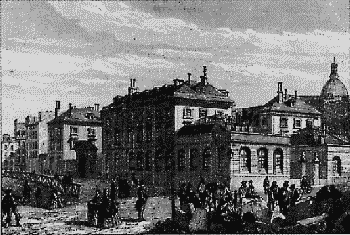| School | Troops | Resources |
The French Liberal School

The "French Liberal School" is how we shall term the 19th Century French economists which followed the tradition, both in politics and economics, set by the theorist Jean-Baptiste Say. In economics, this meant pursuing a loose sort of Classical School economics while maintaining a prominent role for utility and demand. They also eschewed most of the Classicals' pessimistic stories about the iron law of wages, the inexorable rise of rents, the wage-profit trade-off, unemployment by mechanization, general gluts, etc., preferring instead to emphasize the happier "harmonies" between the classes and the infallibility of a self-regulating system of markets. Politically, that meant upholding a radical laissez-faire line. In sum, they can be considered the French counterparts of the British "Manchester School" with a dash of better theory and a good deal of optimism. Karl Marx would later deride them as the "vulgar" economists.
French liberalism can trace its roots to the Enlightenment philosophers and economists, notably the Physiocrats, Turgot and Condillac. After the French Revolution of 1789, a group of philosophers and economists tried to re-launch the liberal spirit of the Enlightenment in a republican France that was still suspicious of any intellectual relics of the Ancien régime. These were known as the the "Idéologues". Leading the fray was Destutt de Tracy and Jean-Baptiste Say. The journal La Décade philosophique was their principal organ.
The rise of the imperial regime of Napoleon Bonaparte, who sought to create a "war economy" buffeted by protectionism and regulation, led to the suppression of the idéologues. However, after 1815, the restored Bourbon rulers showered the remnants of the liberals with honors and dignities, initiating a long tradition of intimacy between the liberal school and the French establishment. However, many liberals (notably Charles Comte and Charles Dunoyer) were discontented with the illiberal tendencies of the Bourbons and supported the 1830 July Revolution. The liberals' greatest competitors during this era were the early French socialists -- notably, Sismondi. The amorphous doctrines of Saint-Simon hovered between the two camps.
Around the middle of the 19th Century, the French liberal banner was carried by a group of academics and writers whom we shall collectively refer to as the "journalistes" (they were also known as the "laissez-faire ultras" or the "Paris Group"). In 1842, they founded the Société d'Économie Politique and the highly-influential Journal des économistes. They had a powerful ally in the publishing house of Guillaumin, which produced Coquelin's famous Dictionnaire d'économie politique (1852), restating economic debates from a liberal slant. Guillaumin also put out reprints and translations of older famous economic tracts.
The central figures of the journaliste movement include Michel Chevalier, Jean-Gustave Courcelle-Seneuil and Gustave de Molinari. Their advocacy of laissez-faire economic policy was just as extreme (if not more) than their Anglo-Saxon counterparts and their influence on government policy was unmatched anywhere else. It was during this time that popular laissez-faire satirist Frédéric Bastiat had his greatest hits. But in the battle for the hearts and minds of the French population, their socialist rivals registered some success by painting the liberals as stooges of the corrupt Orleanist regime. However, the socialists themselves were discredited by the debacle of 1848 and virtually disappeared off the map with the formation of the Second Empire under Napoleon III.
The journalistes (especially the younger Says) were initially wary of Napoleon III, whom they regarded as a populist dictator. But Chevalier ingratiated himself quickly with the new regime, and gradually brought the others over. Any misgivings over the new emperor fell away when he approved the 1860 Cobden-Chevalier treaty with Britain, followed up quickly by treaties with Belgium, Germany, Italy, etc. achieving in a couple of years what generations of liberals had been agitating for decades: the spread of free trade across Europe.
The journalistes exercised an iron grip over the economics profession during the Orleanist period and the Second Empire. Most positions in French universities were filled by orthodox liberals. The prestigious research perch at the Collège de France remained in their hands from its creation in 1831 until the next century -- passing from J.B. Say to Rossi to Chevalier to Leroy-Beaulieu. They also controlled the economics section of the all-powerful Institut de France, the academy of sciences that looms over so much of French intellectual life.
We should also note that, already by the 1830s, the French Liberal School had jettisoned serious economic theory. Most of the journalistes focused on the art of economic policy, allowing a loose sort "supply-and-demand" logic to guide their thinking without adhering to any specific foundations. Serious economic theory -- especially of the mathematical kind -- was pursued by lone figures such as Augustin Cournot, Auguste Walras and Léon Walras. But the liberal school did approve this on methodological grounds. Their concerted assault on Cournot and Walras (père and fils) crushed these men in the academic press and drove their works to the fringes. The socialist-leaning French engineer-economists, like Jules Dupuit, Frédéric Le Play and Émile Cheysson, were spared only because they were safely sheltered in the grandes écoles, the only academic institutions not controlled by the orthodox liberals.
The liberals' fall from grace came soon after 1878, when chairs in political economy were established in law faculties throughout France. These were filled mostly by members of the new French Historical School. Thereafter, French economics veered in an empirical direction and economic policy took on a more corporatist direction. The Journal des economistes's monopoly was broken in 1887 by the considerably more pluralist Revue d'économie politique.
|
The Philosophes: Liberals of the French Enlightenment
The Idéologues: Republican Liberals
Restoration-Orleanist Liberals
The Journalistes: Liberals of the Second Empire
Other Continental Liberals
|
HET
|
|
Resources on the French Liberal School
|
All rights reserved, Gonçalo L. Fonseca
